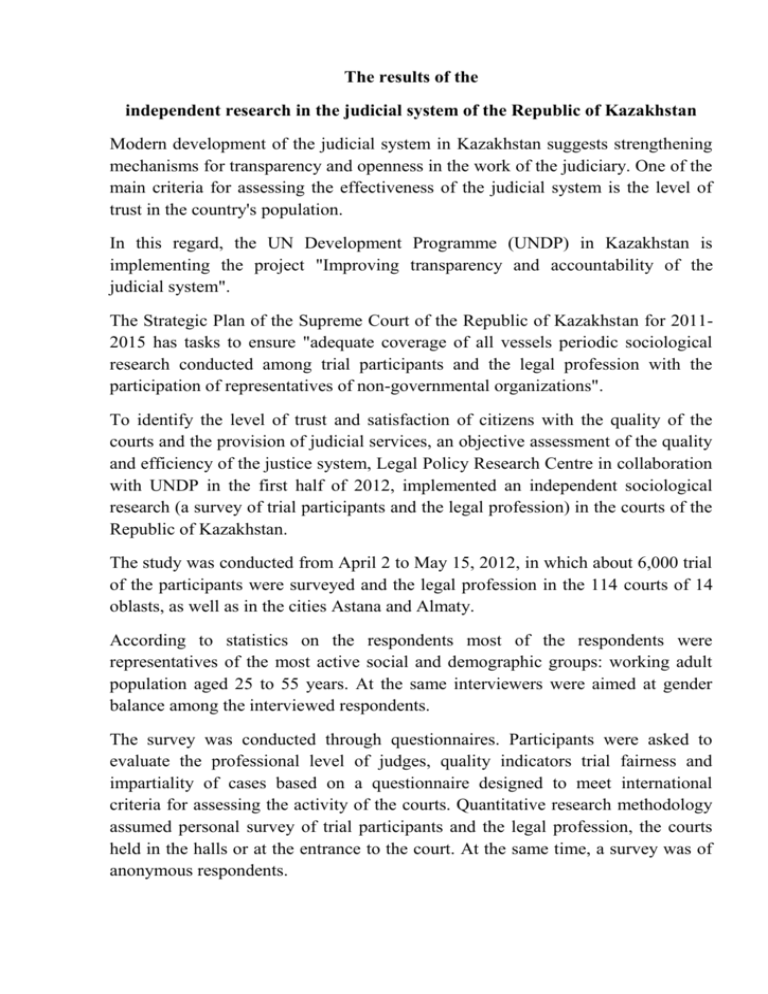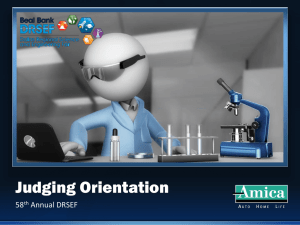The results of the independent research in the judicial system of the
advertisement

The results of the independent research in the judicial system of the Republic of Kazakhstan Modern development of the judicial system in Kazakhstan suggests strengthening mechanisms for transparency and openness in the work of the judiciary. One of the main criteria for assessing the effectiveness of the judicial system is the level of trust in the country's population. In this regard, the UN Development Programme (UNDP) in Kazakhstan is implementing the project "Improving transparency and accountability of the judicial system". The Strategic Plan of the Supreme Court of the Republic of Kazakhstan for 20112015 has tasks to ensure "adequate coverage of all vessels periodic sociological research conducted among trial participants and the legal profession with the participation of representatives of non-governmental organizations". To identify the level of trust and satisfaction of citizens with the quality of the courts and the provision of judicial services, an objective assessment of the quality and efficiency of the justice system, Legal Policy Research Centre in collaboration with UNDP in the first half of 2012, implemented an independent sociological research (a survey of trial participants and the legal profession) in the courts of the Republic of Kazakhstan. The study was conducted from April 2 to May 15, 2012, in which about 6,000 trial of the participants were surveyed and the legal profession in the 114 courts of 14 oblasts, as well as in the cities Astana and Almaty. According to statistics on the respondents most of the respondents were representatives of the most active social and demographic groups: working adult population aged 25 to 55 years. At the same interviewers were aimed at gender balance among the interviewed respondents. The survey was conducted through questionnaires. Participants were asked to evaluate the professional level of judges, quality indicators trial fairness and impartiality of cases based on a questionnaire designed to meet international criteria for assessing the activity of the courts. Quantitative research methodology assumed personal survey of trial participants and the legal profession, the courts held in the halls or at the entrance to the court. At the same time, a survey was of anonymous respondents. As participants and other processes involved in the case, mainly according to a survey serve citizens from 25 to 55 years, i.e. representatives of the most active socio-demographic group - working adult population. Also, it was revealed that the majority of those surveyed, had a higher education. In the course of questioning a special place was given to the quality of staff offices courts. Questions contained in the questionnaire were aimed at identifying the level of professionalism of the staff offices, ethics and fairness in the performance of official duties, openness and free access. The majority of respondents were satisfied with the behavior of the staff of the Office. Thus, more than 75 % of respondents noted friendliness and respect from employees Chancery courts. 19.7 % of respondents expressed dissatisfaction with the fact that the Office of the workers were not always due respect when dealing with citizens, contact the office of the courts, and 5 % reported that they were rude. This means that a quarter of those surveyed, had difficulties in applying to the courts. According to the survey, more than two-thirds of respondents indicated a high level of service and professionalism of the Office of the Courts. 5.20% Office employess of the court were kind and respectfull 19.70% 75.10% Office employess of the court not always were kind and respectfull Office employees of the court were rude and unrespectfull In turn, 30 % of the staff of the Office were not sufficiently competent or behaved unprofessionally in consultation with the citizens involved in the orbit of the proceedings as representatives of parties or other persons involved in the case. 7.10% 22.80% Office employees gave full answers to my questions 71.00% Not all office employess gave full answers to my questions Office employees didn't know the answers to my questions In general, the survey results showed a good picture of the level of work behavior and professionalism of the office. At the same time, an average of 1/5 of those surveyed do not believe the Office of the Courts. Behavior of judges and their compliance with the Code of Judicial Ethics is an important factor in assessing the impartiality of judges. The judiciary should make their decision based on the facts and in accordance with the law, to the exclusion of any direct or indirect restrictions, improper influences, inducements, pressures, threats or interference, wherever they occur and whatever motivated. The UN Committee on Human Rights has indicated in a decision that the right to be heard by an independent and impartial tribunal is and cannot be subject to restrictions or how. This principle means that the court imposed the objective requirements of impartiality, according to which both sides have equal procedural position. According to the Code of Judicial Ethics of the Republic of Kazakhstan "the judge must be polite, tolerant, considerate and respectful in relation to the trial participants. A judge should require similar conduct of all persons participating in the proceedings. " The judge's impartiality interviewers assessed by the degree of correctness and ethics that reflect his attitude to the case, as well as subjective evaluation of those interviewed. According to the survey, in 87 cases out of 100 judges attentively listen to speeches litigators. However, respondents noted that judges in 13 % of cases, partially or completely inattentive treated to performances of participants processes or other persons involved in the case. 19.10% 3.90% Judge carefully listened to my speech 87.00% Judge listened my speech not carefully Judge not always listened to me carefully A similar trend was noted in the results of the evaluation of correctness of the judge. For example, 12.1 % of those surveyed said that the judge allowed improper attitude to individual actors and others participating in the party, which was a direct violation of the Code of Judicial Ethics and indirectly may indicate a lack of impartiality. 4.30% 7.80% Judge is correct to me during the process Judge is not correct to me during the process 87.90% Judge is not always correct to me during the process More satisfactory picture has been developed to the level of public confidence in judges. 82.4 % of respondents expressed confidence in judges. However, 3.1 % of those surveyed felt the judges are not credible, based on personal beliefs and experiences. 82.40% I think judge is a person to trust Judge is not a person to trust 1.4 Judge is not a person to trust in whole 3.10% The analysis showed that more than 82 % of respondents were satisfied with the level of justice proceedings. Nevertheless, 17 % of the questionnaires interviewees questioned the fairness of the consideration of the case to individual judges. 5.50% 11.60% Judge rightly hears my case Judge hears my case not rightly 82.90% Judge is not obhective in whole Professional level of judges evaluated from the standpoint of competence, knowledge and communication skills of judges. Despite the fact that the professionalism of the judge was rated at a high level in 65% of cases, part of the respondents (20.5%) indicated that the level of knowledge, competence and sociability judges were not sufficient for the judiciary. 64.90% On a high level On a medium level 1.2 15.60% On a low level It's hard to respond 4.90% Respondents' assessment of compliance with the equality of the parties 3.90% The parties had equal opportunities to have views and give information during the process 11.60% 84.50% The parties had equal opportunities in whole to have views and give information during the process The parties had equal opportunites to have views and give information during the process Assessing the level of training of judges for trial 90.10% The judge was ready enough to the trail Judge was not in whole ready to the trail 1.4 Judge was not enough ready to the trail 7.80% Evaluation of objectivity and impartiality of the process 3.40% 11.60% Process was objective and impartial Process was objective and impartial not in whole 85.00% Process was not objective and impertial It should be noted that the questionnaire contained checklists aimed at identifying reliable data on citizens assessment of objectivity and impartiality of judges of the Republic of Kazakhstan. In particular, the questionnaire was provided previously considered questions about assessing the level of confidence in judges and appraisal respondents to fair trial judge. Analysis of three diagrams indicates that the data provided in the questionnaires have a sufficient degree of reliability and representativeness. An important element of proper administration of justice is a timely start of hearings designated for consideration. Compliance with the designated start time of the court hearing evidence of the manifestation of respect for the court to litigants, and promotes public confidence in the judiciary. 58% of respondents confirmed that the meeting started on time trial. It should be noted that in the poll was conducted special research on the causes of meetings late. Information about the timely beginning of the trial 11.60% Meeting started on time 30.90% 57.50% eeting started with a little late Meeting started on time with a little late Respondents for representatives of the parties have provided information on cases of unlawful interest of judges and court staff in the outcome of the case. A summary of the responses of representatives of the parties show more than 80 % of the judges and / or court staff showed no interest in the outcome of the case, while 18.2 % reported that informal interest, judges and court officials in the outcome of the case. Representatives of the parties were asked to respond to a question regarding further action planning in case of disagreement with the decision of the court. Analyzing the data, attention is drawn to the fact that 5.9 % of respondents intend to restore their rights, using informal methods and practices. For example, turn to influential people, patrons. We believe that the existence of informal strategies and tactics to solve their problems connected with ambiguous citizens' perceptions judicial institution as a whole and with the confidence that these measures are practiced in the judicial system. Compliance with the established order at the hearing (the judge was in the mantle was removed in the deliberation room, etc.) 2.30% 7.70% Order is observed 90.00% Order is not observed Order is observed not fully These are the highlights of the study. In general, it should be noted that the independent study showed a very positive picture of the activities of the courts of the country. Especially when you consider that questioned not just random people, namely the trial participants who are involved in court orbit We believe that the vast geography of the Project, as well as the use of standardized methodology to ensure high reliability and objectivity of the results of the study. Conclusions and recommendations made on the basis of the information collected, are designed to make a useful contribution to the debate on improving the functioning of the judicial system in the Republic of Kazakhstan.







